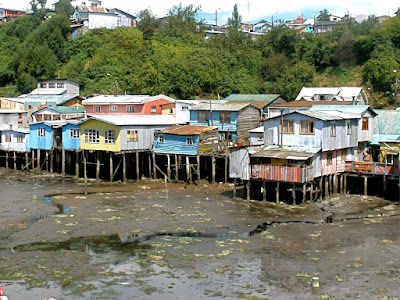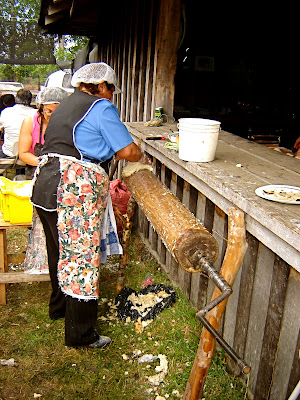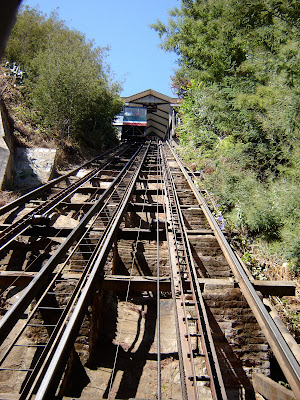Saturday and Into Argentina

Now the paved road of simplicity has turned into the ripio of the Argentine pampa. Ripio is like gravel, only finer, so the bus seems to be limping along at around 30 --and Plotnik just saw a sign that says that el Calafate is 200 kilometers away. That's a long way for a ride over bumpy ripio.
There's not much to see -- except those wildflowers out there, white and red, and an occasional hawk and sometimes a car or another bus coming in the other direction, towards Chile.

At the border, everyone had to exit the bus with their passports and get in line at the Chilean border station. This is high plains country and the wind was intense, blowing tumbleweeds across the highway, except there weren't any tumbleweeds, but if there had been you would have seen them moving left to right at great speed. The idea was to get off the bus, run through the wind into the border patrol office and get in line.
Backtrack: once or twice before, hostels in Chile asked Plotnik and Ducknik for their yellow copies of the immigration forms they had had to fill in when they arrived at the Santiago airport. Plot didn't remember having copies, so he showed each hostel the place where the Chileans had stamped their passports and that was enough for the hosteleros.
Except that each time they didn't see the yellow copies, the women behind the counter at the various hostels looked up quizically at Plotnik, as if to say: "You really ought to be carrying those yellow copies."
Well, yah, Bunko. Border Patrol officers with uniforms and guns are not the same as hostel keepers with forks and table cloths. The border patrol guard didn't listen when Plot said he and Ducknik didn't know where their copies were, he just said
"Busca su equipaje," and waved Plot away from the window.
The only place Plotnik, could imagine that the yellow copy of the Chilean immigration form could be was the brown zipper folder in which he keeps his passport and other necessities.
The problem was his passport was in his shirt pocket but the brown zipper folder was in Plotnik's suitcase and the suitcase was under the bus. In the very back of the suitcase locker as it turns out.
So Plot had to rush across the blustery road, determine that the suitcase storage was indeed locked, run back across through the wind to find the bus driver, who said "Que? Quitar las maletas?"
"Well, yes, I'm sorry," Plot said, "but yes indeed, we cannot leave Chile unless we produce these papers and the only place they might be is..."
OK, OK, said the bus driver and told his assistant that everybody's suitcase now had to come out of the bus and be placed on the windy road, so the two people from America would be able to find their papers.
Most of the other passengers on this bus (and every bus in Patagonia) were Germans, so they had already produced their yellow papers, because they are Germans, and had their copies EXACTLY where they were supposed to be, so they would have them when they needed them. And what did all their orderliness get them, hah?
The Germans now watched with horror as all their suitcases were removed from the bus onto the windy road. Plot kept looking into the huge maw of the suitcase locker under the bus, saying: "Quite esto! Y esto! Y esto!" And with each suitcase they brought out, to get closer to Plotnik and Duck's suitcases, another German face with wide eyes and a red nose appeared at the window of the bus.
Plot is only enjoying thinking about this now, because THEN it was awful.
Plot found his suitcase, unlocked the little combination lock he and Duck bought at the Toronto Airport, which snaps together the two zippers of the main pocket, reached down to the bottom of this suitace, pawed around amongst his socks and short sleeve shirts and found the brown ziper folder.
He unzipped it, looked inside, holding his breath, and: There was his yellow copy!
Halleluyah, he shouted, leaving Duck behind to supervise the reloading of the suitcases back onto the bus, ran back across the windy road into the Border Patrol office, and handed his yellow copy of the immigration form triumphantly to the Border Policeman, who nodded and said. "Bueno! Y el otro?"
"What other one? You mean my wife has one of these too?"
"Claro," said the officer. "Una persona, una copia."
(INTERRUPTION: Plotnik just looked out the window and saw real gauchos! Waving their bolos. Riding their horses, dressed in brown leather jackets and black leather hats. The boys in the Castro would love this place.)
BACK TO THE STORY
Plotnik needed Ducknik to find HER yellow copy now, but Ducknik was in the bathroom.
"Un momento, Plot said," and the border agent managed to look both annoyed and bored.
The line was almost finished when Duck came out ot the bañero and Plot told her she needed her yellow form, and she said "I have one too? Let me look in my pack."
She did. It was there. Four more dashes across the windy road and the Plotniks were officially out of Chile. Qye les vaya bien, Chilotes!
A hundred yards later, the bus stopped again so the passengers could now enter into Argentina. Hola, chicos! No yellow forms in Argentina, only stamps.
Same road, just a hundred yards further, same wind, same scramble across the road and into the Argentine border patrol office, where there were wanted posters on the wall with faces that looked 100 years old, mostly about kidnapped children, with huge letters that said 50 U$S 000! Manuel Zapata Corquinez! And then a picture of Manuel Zapata Corquinez that might have been Butch Cassidy.
Back on the bus, and it turns out that the front of the bus is all middle-aged Germans and the rear of the bus is all Israeli kids. The Israelis are loud and having fun, and they sing in the customs line and the men flirt with the women and everybody flashes huge happy smiles. Meanwhile, the Germans don't smile at all, the French keep to themselves, the Argentinians continue to speak their incomprehensible language, where they add a 'sheh" whenever they damned well feel like it, the bus driver pushes the big bus slowly down the ripio, Ducknik sleeps by the window and Plot writes on his computer, staring out the window at not nothing, just almost nothing, but as far as almost nothing goes, this is a very, very nice almost nothing.


















































